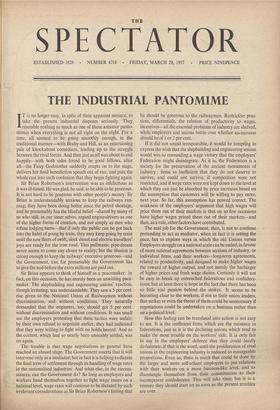THE INDUSTRIAL PANTOMIME
IT is no longer easy, in spite of their apparent menace, to take the present industrial disputes seriously. They resemble nothing so much as one of those amateur panto- mimes when everything is not all right on the night. For a time, all seemed to be going smoothly enough, in the traditional manner—with Braby and Hill, as an entertaining pair of knockabout comedians, leading up to the struggle between the rival forces. And then just as all was about to end happily—with both sides found to be good fellows, after all—the Fairy Godmother suddenly erupts on to the stage, delivers her final benediction speech out of cue, and puts the whole cast into such confusion that they begin fighting again.
Sir Brian Robertson's intervention was as infelicitous as it was ill-timed. He was glad, he said, to be able to be generous. It is not hard to be generous with other people's money. Sir Brian is understandably anxious to keep the railways run- ning; they have been doing better since the petrol shortage, and he presumably has the blissful belief—shared by many of us who still, in our inner selves, regard engine-drivers as one of the higher forms of creation, and not simply as men who refuse lodging turns—that if only the public can be got back into the habit of going by train, they may keep going by train until the new fleets of swift, sleek diesel and electric travellers' joys are ready for the iron road. This pullmanic pipe-dream never seems to come any closer to reality; but the illusion is strong enough to keep the railways' executive generous—and the Government, too; for presumably the Government has to give the nod before the extra millions are paid out.
Sir Brian appears to think of himself as a peacemaker : in fact, on this occasion, he has merely been an unwitting pace- maker. The shipbuilding and engineering unions' reaction, though irritating, was understandable. They saw a 5 per cent. rise given to the National Union of Railwaymen without discrimination, and without conditions. They naturally demanded that the engineers, too, should get 5 per cent. without discrimination and without conditions. It was small use the employers protesting that these tactics were unfair; by their own refusal to negotiate earlier, they had indicated that they were willing to fight with no holds barred. And so the contest, which had so nearly been amicably settled, was on again.
The trouble is that wage negotiations in general have reached an absurd stage. The Government asserts that it will intervene only as a mediator; but in fact it is helping to dictate the final term of settlement through its handling of wage rates in the nationalised industries. And what else, in the circum- stances, can the Government do? So long as employers and workers band themselves together to fight wage issues on a national level, wage rates will continue to be dictated by such irrelevant considerations as Sir Brian Robertson's feeling that he should be generous to the railwaymen. Restrictive prac- tices, differentials, the relation of productivity to wages, incentives—all the essential problems of industry are shelved, while employers and unions battle over whether an increase should be of 1 or 2 per cent.
If it did not sound irresponsible, it would be tempting to express the wish that the shipbuilding'and engineering unions would win so resounding a wage victory that the employers' Federation might disintegrate. As it is, the Federation is a society for the preservation of the ancient monuments of industry : firms so inefficient that they do not deserve to survive, and could not survive, if competition were not restricted, and if wage rates were not kept down to the level at which they can just be absorbed by price increases based on the assumption that customers will be willing to pay more, next year. So far, this assumption has proved correct. The weakness of the employers' argument that high wages will price them out of their markets is that on so few occasions have higher wages priced them out of their markets—and then, as a rule, other factors have contributed.
The real job for the Government, then, is not to continue pretending to act as mediator, when in fact it is setting the pace, but to explore ways in which the old Unions versus Employers struggle on a national scale can be ended, in favour of more rational agreements between sections of industry, or individual firms, and their workers—long-term agreements, related to productivity, and designed to make higher wages the reward of higher output, and not merely, the harbinger of higher prices and fresh wage claims. Certainly it will not be easy to break up entrenched federations and confedera- tions; but at least there is hope in the fact that there has been so little real passion behind the strikes. It seems• to be becoming clear to the workers, if not to their union leaders, that strikes or even the threat of them could be unnecessary if negotiations could be undertaken on a business rather than on a political level.
How this feeling can be translated into action is 'not easy to see. It is the inefficient firms which are the nuisance in federations, just as it is the declining unions which tend to make the most trouble on the workers' side. It is only fair to say in the employers' defence that they could hardly de-federate, if that is the word, until the proliferation of rival unions in the engineering industry is reduced to manageable proportions. Even so, there is much that could be done by the larger and more self-reliant employers to put relations with their workers on a more business-like level, and to disentangle themselves from their commitments to their incompetent confederates. This will take time; but it is a venture they should start on as soon as the present troubles are over.


































 Previous page
Previous page